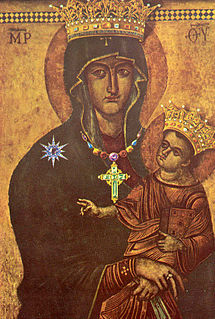An encyclical was originally a circular letter sent to all the churches of a particular area in the ancient Roman Church. At that time, the word could be used for a letter sent out by any bishop. The word comes from Late Latin encyclios.

Sacro Vergente anno is an Apostolic Letter of Pope Pius XII to all people of Russia. In it the Pope consecrates all the people of Russia to the Immaculate Heart of Mary. Because of the Virgin Mary, he has great faith in the future of their country but is anguished about the Soviet hostility towards religion in general and the Catholic Church in particular.
Pope Pius XII and the Church in China involves relations of the Holy See with China from 1939-1958. The Vatican recognized Chinese rites in 1939, elevated the first Chinese cardinal in 1946, and established a Chinese hierarchy.
Ad Apostolorum principis is an encyclical of Pope Pius XII on Communism and the Church in China. It describes systematic persecutions of bishops, priests, religious and faithful and the attempts of the government to establish a patriotic Catholic Church, independent of Rome.
Evangelii praecones was an encyclical letter of Pope Pius XII about Catholic missions. In it, he described necessary improvements and changes, and the persecution of the Church in some parts of the world. The encyclical was issued in commemoration of the 25th anniversary of the encyclical Rerum ecclesiae by his predecessor Pope Pius XI.
Cupimus imprimis is an apostolic letter of Pope Pius XII to all the faithful in China regarding their persecutions and the persecution of the Catholic Church.
Veritatem Facientes is an apostolic letter of Pope Pius XII to the Catholic faithful of Romania, protesting against their persecution and the virtual eradication of the Catholic Church in their country. The letter asks for courage and prayers.
Impensiore Caritate, is an Apostolic Letter of Pope Pius XII to the persecuted bishops, priests, and faithful of Czechoslovakia.
Gloriosam Reginam is an Apostolic Letter of Pope Pius XII to the Polish episcopate, to protest against the persecution of the Church in Poland, and, to commemorate the 300th anniversary of Jasna Góra, the Polish sanctuary of the Virgin Mary. The invincible Mother of God, who watches over the freedom for Poland, will most certainly assist.
Poloniae Annalibus is an apostolic letter of Pope Pius XII commemorating the seven hundredth anniversary of the canonization of Saint Stanislaw and encouraging the Polish episcopate to be united and strong in face of persecution.
Orientales omnes Ecclesias is an encyclical of Pope Pius XII to the faithful of the Ukrainian Greek Catholic Church. It commemorates the three hundred and fiftieth anniversary of the Union of Brest.
Orientales ecclesias is an encyclical of Pope Pius XII concerning the persecution of the Eastern Catholic Churches and describing the desperate situation of the faithful in Bulgaria.
Pope Pius XII and Russia describes relations of the Vatican with the Soviet Union, Russia, the Orthodox Church, and United Oriental Churches resulting in the eradication of the Church in most parts of the Soviet Union during the Stalinist era. Most persecutions of the Church occurred during the pontificate of Pope Pius XII.
Persecutions against the Catholic Church took place throughout the pontificate of Pope Pius XII (1939-1958). Pius' reign coincided with the Second World War, the commencement of the Cold War and the accelerating European decolonisation. During this time, the Catholic Church faced persecution under Fascist and Communist governments.
Pope Pius XII and Poland includes Church relations from 1939–1958. Pius XII became Pope on the eve of the Second World War. The invasion of predominantly Catholic Poland by Nazi Germany in 1939 ignited the conflict and was followed soon after by a Soviet invasion of the Eastern half of Poland, in accordance with an agreement reached between the dictators Joseph Stalin and Adolf Hitler. The Catholic Church in Poland was about to face decades of repression, both at Nazi and Communist hands. The Nazi persecution of the Catholic Church in Poland was followed by a Stalinist repression which was particularly intense through the years 1946–1956. Pope Pius XII's policies consisted in attempts to avoid World War II, extensive diplomatic activity on behalf of Poland and encouragement to the persecuted clergy and faithful.
Cum Jam Lustri is an Apostolic Letter of Pope Pius XII, dated September 1, 1951, to the bishops "and brave people" of Poland about their sufferings during Stalinist persecution. He asks for prayers to the Virgin Mary, because she will not deny her help to the Polish people, who dedicated themselves to her protection.

The Vatican and Eastern Europe (1846–1958) describes the relations from the pontificate of Pope Pius IX (1846–1878) through the pontificate of Pope Pius XII (1939–1958). It includes the relations of the Church State (1846–1870) and the Vatican (1870–1958) with Russia (1846–1918), Lithuania (1922–1958) and Poland (1918–1958).
The Eastern canonical reforms of Pope Pius XII were the several reforms of Oriental canon law and the Codex Iuris Canonici Orientalis, applying mainly to the Oriental Churches united with the Latin Church in communion with the Roman Pontiff. The Holy See's policy in this area had always two objectives, the pastoral care of approximately ten million Christians united with Rome and the creation of positive ecumenical signals to the two-hundred and fifty million Orthodox Christians outside the Church of Rome.
Eastern Catholic victims of Soviet persecutions include bishops and others among the tens of thousands of victims of Soviet persecutions from 1918 to approximately 1980, under the state ideology of Marxist–Leninist atheism.


